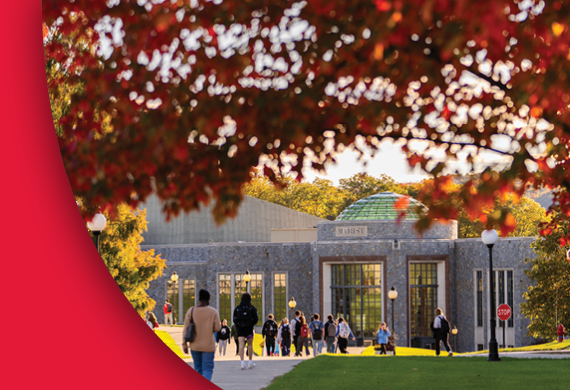Navigating Emotions and Information in Times of Turmoil

November 6, 2023 — In the last few weeks, many in the Marist community have been hurting and may still be processing a wide range of emotions over recent world events, most notably those in the Middle East. Navigating the overwhelming volume of images and information - and increasingly disinformation - can be a daunting task, making it difficult to manage emotional responses.
Marist faculty and staff offered tips to help manage emotions related to current events and foster a caring community.
Importance of Promoting Mental Health
Dr. Daria Hanssen, Marist’s Bachelor of Social Work Program Director, said it is important to acknowledge the fear, grief, anger, or other feelings that we and those around us are experiencing.
“We can each be an agency of peace and justice in our own lives and with others,” said Dr. Hanssen, who is also an associate professor of social work. “Be kind to one another and this is a time to respect one another’s boundaries in delicate conversations.”
In these challenging times, Dr. Hanssen says everyone can play a part in creating a community of peacefulness dedicated to empathic learning and the pursuit of a better world.
“Amidst this world of conflict, injustice and strife, we can all do what we can to create a community of peacefulness devoted to empathic learning and hope for a better world,” she added.
Dr. Hanssen said the media we consume can cause more harm than good, and to be on the lookout for signs of mental health struggles. They could range from feeling exhausted to experiencing increased stress, anxiety, or even a sense of hopelessness.
Pitfalls of Media Consumption
In the age of the 24/7 news cycle and social media, staying plugged into the constant stream of information has become a challenge, making it difficult to unplug and find moments of respite. The accessibility of news through digital platforms and social media ensures that updates and headlines are just a click away, contributing to information overload.
According to the Pew Research Center, approximately 50 percent of Americans rely on social media for their news. In recent weeks, our social media feeds have been inundated with graphic footage from the Middle East, with some of it being accurate, and some not.
Dr. Amanda Damiano, Director of Marist's Center for Social Media, underscores that while social media provides swift information sharing, it doesn't consistently convey the truth, contributing to confusion and animosity.
“When it comes to verifying the accuracy of information, media literacy skills are key,” said Dr. Damiano, whose research interests include social and psychological effects of new media technology. “Being able to effectively and efficiently comprehend and use mass communication must be a constant goal: Knowledge is power.”
Photo by wachiwit/stock.adobe.com.
Dr. Damiano highlighted the difficulty social media companies face in combatting misinformation due to the relentless global information flow. While Meta, the parent company operating Facebook, Instagram, and Threads, is reportedly strengthening security measures in response to a surge in rule-violating content, TikTok has also bolstered its moderation efforts. On the other hand, platforms like Twitter/X have faced staffing challenges, underscoring the importance of users flagging false content.
To ensure the accuracy of information, Dr. Damiano said media literacy skills are essential.
“It's important to verify information by cross-referencing it with three reputable sources that confirm the facts. We must think before we share, and sources with editorial control, which attempt to verify content validity, are ideal,” she said.
Services Available to the Marist Community
Self-care is extra important during times like these. Counseling Services are available to any student seeking support, a compassionate listener, or related services, and they can be accessed both in-person and online.
“Taking care of ourselves and each other is especially important during times like these, and it can look different for each person,” said Marisa Moore, Director of Counseling Services. “For example, some people may prefer to journal out their thoughts and feelings on paper or on their (smartphone) notes app.”
Moore said students are always welcome to schedule an appointment or stop by one of Counseling Services’ three Let's Talk locations, which offer informal, private consultations with a Counseling Center clinical counselor. Additionally, the Thriving Campus resource is available for finding off-campus or at-home therapists, making it a valuable resource, especially during breaks.
Learn more here about Counseling Services and using the Let’s Talk and Thriving Campus resources.
Additional resources include:
Office of Spiritual Life and Service is available for any member of our community, regardless of their faith.
Office of Diversity, Equity, and Inclusion is available to meet with students, faculty, and staff who may want to discuss their concerns about the local or global climate.
Faculty and staff enrolled with College benefits can also utilize the Employee Assistance Program, a benefit managed through Aetna: (888) 238-6232.



